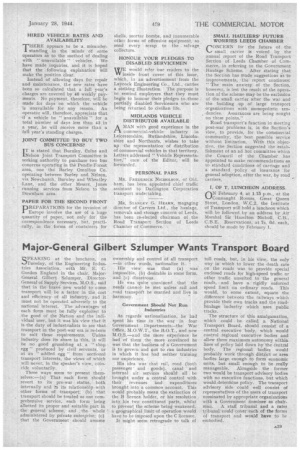Major-General Gilbert Salumper, Wants Transport Board
Page 21

If you've noticed an error in this article please click here to report it so we can fix it.
-SPEAKING at the luncheon, on ...)Tuesday, of the Engineering Industries Association, with Mi. E. C. Gordon England in the chair, MajorGeneral Gilbert Szlumper, DirectorGeneral of Supply ,Services, Pel.O.S., said that in the brave new world to come transport will be a factor in the cost and efficiency of all industry, and it must not be operated adversely to the national interest. The advantages of each form must be fully exploited to the good of the Nation and the individual user, but it was his view that it is-the duty of industrialists to see that transport in the post-war era is re-born to suit these requirements. Unless industry does its share in this, it will be no good grumbling at. a "shop . egg '' produced by civil servants, or at an " addled egg " from sectional transport interests, the views of which will -never, in the speaker's view, cein
cide voluntarily. • Three ways seem to present themselves:—(a) That each form should revert to its pre-war status, both internally and 'in its relationship with other forms of transport; (b) that transport should he treated as one comprehensive service, each form being allotted its proper and suitable part in the general scheme, and the whole administered by private enterprise; (c) that the Government should assume ownership and control of all transport —in other words, nationalize it. , His view was that (a) was' impossible, (b) desirable in some form, and (c) disastrous.
He was quite 'convinced that the needs -cannotbe met unless rail and road transpoft be married and live in • harmony.
Government Should Not Run Industries
As regards nationalization, he had spent his time in the war' in four Government Departments--the War Office, M.O.W.T., the B.O.T., and now M.O.S.--and the more experience he had of them the more .convinced he was that the busiiiess of a Government is to govern and aot to run industries in which it has had neither training nor experience.
His idea was that rail, road (both passenger ' and goods), canal and internal air services shot:it:1 all be brought under a central control with their revenues and expenditures brought into a common account. This would probably mean the extinction of the B licence holder, or hisresolution into his two constituent parts, whilst to prevent the scheme being weakened, a 'geographical limit of operation would have to be•imposed upon the C licensee. It might' seem retrograde to talk .of toll roads, but, in his view, the only way in which to lower the death rate On the roads was to provide special enclosed roads for high-speed traffic or other traffic unsuited to the general roads, and have a rigidly enforced speed limit on ordinary roads. This would, to some extent, equate the ' difference between -the railways 'which provide their own tracks and the roadhaulage industry which uses public tracks.
The structure of this amalgamation, which could be called a National Transport Board, should consist of a central executive body, which would control regional executive bodies and allow them maximum autonomy within lines of policy laid down by'the central body. The regional bodies would probably work through district or area bodies large, enough to form economic units, but small enough to be really manageable. Alongside the former two would be transport advisory bodies with no executive functions, but which would determine policy. The transport advisory side could well consist of representatives of the users of transport nominated by appropriate organizations with a Government nominee as chairman. A staff tribunal and a rates tribunal could cover each of the forms of transport and would have to be embodied.




















































